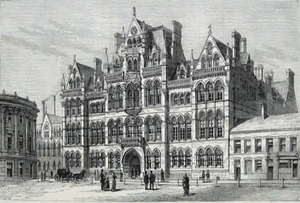Percy F. Frankland facts for kids
Percy Faraday Frankland (born October 3, 1858 – died October 28, 1946) was an important British chemist. He made many discoveries and taught chemistry at universities.
Contents
Early Life and Education
Percy Frankland was born in Hampstead, London, on October 3, 1858. His father, Edward Frankland, was also a famous chemist. A very famous scientist, Michael Faraday, was Percy's godfather!
Percy went to University College School from 1869 to 1874. After that, he studied at the Royal School of Mines. There, his own father and other great scientists taught him.
Even though he started studying medicine, his father encouraged him to focus on chemistry. Percy earned his Bachelor of Science degree. He then went to Germany to get his PhD in chemistry at the University of Würzburg.
A Career in Chemistry
In 1880, Percy Frankland came back to London. He started working as a chemistry demonstrator at the Normal School of Science. This school is now part of the Royal College of Science.
Professor and Researcher
In 1888, Percy moved to Dundee to become a Professor of Chemistry. He was very interested in how molecules are shaped (this is called stereochemistry). He also studied tiny living things called bacilli. He grew these tiny organisms in sugar solutions.
A big achievement was when Percy and his wife, Grace Frankland, worked together. In 1890, they were the first to successfully grow a pure culture of a special type of bacteria. These bacteria help turn ammonia into other substances in the soil. This process is called nitrification.
In 1894, Percy became a professor at Mason Science College in Birmingham. This college later became the University of Birmingham. He retired from his work at the end of the First World War, when he was 60 years old.
Awards and Recognition
Percy Frankland was recognized for his important work in chemistry.
- In June 1891, he was chosen as a Fellow of the Royal Society. This is a very high honor for scientists in the UK.
- He was the President of the Chemical Society from 1911 to 1913. His father had also held this important position before him.
- In 1919, he received the Davy Medal from the Royal Society. This medal is given for outstanding discoveries in chemistry.
Family Life
In 1882, Percy Frankland married Grace Toynbee. Grace was also a scientist and worked closely with Percy. She helped him with his research, especially on bacteria and other tiny organisms found in air and water. They even wrote scientific papers together!
Percy and Grace lived in London. They had one son, Edward Percy, who was born in 1884. Edward later had two sons and a daughter. Their daughter, Helga Maud Toynbee Frankland, became a parasitologist. She also wrote about her grandfather Percy and other members of their family.
Later Life
Percy Faraday Frankland passed away on October 28, 1946. He died in the village of Loch Awe in Scotland. He was buried with his wife at Glenorchy Parish Church in Dalmally.
You can find many of Percy Frankland's old papers and writings at the University of Manchester Library. Some of his materials are also kept at the University of Dundee.
 | Precious Adams |
 | Lauren Anderson |
 | Janet Collins |


